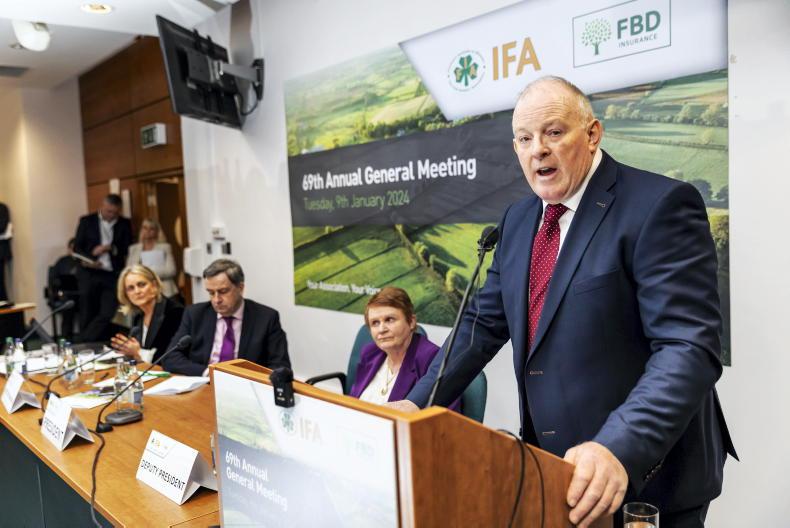The review of IFA operations by former chief economist Con Lucey is underway and he will report, with recommendations, in just two weeks time.
Lucey has invited IFA members to come forward with their own views. The deadline for member submissions to the review is Monday 7 December. Here are some of the issues which have been raised at farmer meetings and which the review is likely to consider.
Transparency and pay levels
These are the red letter issues for the review. At a minimum, farmer members will want to be told the pay levels of the next general secretary and the next president, each year, and farmers will watch closely to see how high or low they are set.
On transparency, Con Lucey could recommend that just the salary of the general secretary (GS) is published. More likely, he will recommend this plus all other payments the GS receives from other bodies controlled by the IFA.
He is likely to consider whether payments from bodies not connected with the IFA should also be disclosed. He may consider this desirable to avoid any concern that a general secretary is prevented from fully carrying out the job because of payments received from another body.
Making the salary of the general secretary known to members will not be difficult as a new person will now have to be recruited on new terms and conditions. Some farmers have called for the disclosure of salaries of other full-time executives in the organisation.
One straightforward option may be to disclose salary or salary range when recruiting future staff. This is not commonly done in the private sector, partly because it can discourage some good candidates from applying.
Payments to farmers
On the voluntary side of the organisation, all salary payments to the next president and deputy president will clearly be disclosed.
Payments for sitting on outside boards will be disclosed in future too. The review may consider whether other work/travel expenses available to the president and deputy are disclosed. Con Lucey may go a step further and recommend that expenses actually paid are revealed.
Transparency on payments/expenses could extend to:
The executive board which, in addition to the president and deputy, also includes the treasurer and the four regional vice presidents. The executive council which would cover county chairpersons and chairpersons of commodity committees. At present, we know that these officers can claim travel expenses, although we don’t know at what rate or for what items. Pay levels
In addition to transparency, there is the issue of actual pay levels for the general secretary, president and other senior figures.
The review could decide to set no guidelines or ceilings and to, instead, let levels be decided for new appointees by a remuneration committee.
Con Lucey could recommend that the pay of the general secretary and president be benchmarked against counterparts in the public sector, as before.
Governance issues
While members on the ground see transparency and pay levels as the priority, those at the top of the IFA see weakness in governance as being just as important. They blame outdated rules for allowing the association to slide into its current difficulties. The review is likely to consider:
Whether there should be an audit committee and whether it needs an outside member.Whether there should be a corporate governance committee with outside expertise. Whether the balance of decision making power between the president, the general secretary and other senior officers such as the deputy president and the treasurer needs changing.Whether the organisation’s financial controller should ultimately report to the general secretary or the executive council. Other matters
There are other matters that may be examined if there is time. These include the following:
Accounts: The IFA is not a limited company and therefore not obliged to publish full accounts. But should more information be provided to members?Funding of candidates: Running for the IFA presidency can involve spending up to €100,000 on a campaign. Some IFA members argue that candidates should disclose any business or corporate donations to avoid concerns that such donations could weaken the negotiating power of a future president.
Subscriptions and levies: The issue of levies on farm sales, in particular, has attracted a lot of comment. The association may have to examine whether the current ways of raising funds is the best for the future. In the past, farmers have been willing to contribute to ensure they have a successful farm organisation.
They know the alternative is relying on the mercy of meat factories and retailers. But they will expect the next president of the organisation to make a very clear case for why they should continue to do so.
The review of IFA operations by former chief economist Con Lucey is underway and he will report, with recommendations, in just two weeks time.
Lucey has invited IFA members to come forward with their own views. The deadline for member submissions to the review is Monday 7 December. Here are some of the issues which have been raised at farmer meetings and which the review is likely to consider.
Transparency and pay levels
These are the red letter issues for the review. At a minimum, farmer members will want to be told the pay levels of the next general secretary and the next president, each year, and farmers will watch closely to see how high or low they are set.
On transparency, Con Lucey could recommend that just the salary of the general secretary (GS) is published. More likely, he will recommend this plus all other payments the GS receives from other bodies controlled by the IFA.
He is likely to consider whether payments from bodies not connected with the IFA should also be disclosed. He may consider this desirable to avoid any concern that a general secretary is prevented from fully carrying out the job because of payments received from another body.
Making the salary of the general secretary known to members will not be difficult as a new person will now have to be recruited on new terms and conditions. Some farmers have called for the disclosure of salaries of other full-time executives in the organisation.
One straightforward option may be to disclose salary or salary range when recruiting future staff. This is not commonly done in the private sector, partly because it can discourage some good candidates from applying.
Payments to farmers
On the voluntary side of the organisation, all salary payments to the next president and deputy president will clearly be disclosed.
Payments for sitting on outside boards will be disclosed in future too. The review may consider whether other work/travel expenses available to the president and deputy are disclosed. Con Lucey may go a step further and recommend that expenses actually paid are revealed.
Transparency on payments/expenses could extend to:
The executive board which, in addition to the president and deputy, also includes the treasurer and the four regional vice presidents. The executive council which would cover county chairpersons and chairpersons of commodity committees. At present, we know that these officers can claim travel expenses, although we don’t know at what rate or for what items. Pay levels
In addition to transparency, there is the issue of actual pay levels for the general secretary, president and other senior figures.
The review could decide to set no guidelines or ceilings and to, instead, let levels be decided for new appointees by a remuneration committee.
Con Lucey could recommend that the pay of the general secretary and president be benchmarked against counterparts in the public sector, as before.
Governance issues
While members on the ground see transparency and pay levels as the priority, those at the top of the IFA see weakness in governance as being just as important. They blame outdated rules for allowing the association to slide into its current difficulties. The review is likely to consider:
Whether there should be an audit committee and whether it needs an outside member.Whether there should be a corporate governance committee with outside expertise. Whether the balance of decision making power between the president, the general secretary and other senior officers such as the deputy president and the treasurer needs changing.Whether the organisation’s financial controller should ultimately report to the general secretary or the executive council. Other matters
There are other matters that may be examined if there is time. These include the following:
Accounts: The IFA is not a limited company and therefore not obliged to publish full accounts. But should more information be provided to members?Funding of candidates: Running for the IFA presidency can involve spending up to €100,000 on a campaign. Some IFA members argue that candidates should disclose any business or corporate donations to avoid concerns that such donations could weaken the negotiating power of a future president.
Subscriptions and levies: The issue of levies on farm sales, in particular, has attracted a lot of comment. The association may have to examine whether the current ways of raising funds is the best for the future. In the past, farmers have been willing to contribute to ensure they have a successful farm organisation.
They know the alternative is relying on the mercy of meat factories and retailers. But they will expect the next president of the organisation to make a very clear case for why they should continue to do so.










SHARING OPTIONS